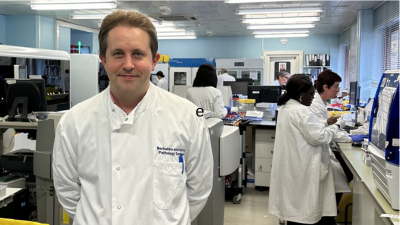 A Frimley Health consultant has featured in an article in the New York Times, following his work on COVID-19 treatments.
A Frimley Health consultant has featured in an article in the New York Times, following his work on COVID-19 treatments.
Dr Stephen Winchester, a consultant medical virologist at the Trust for nine years, was interviewed by the influential American newspaper after leading research testing a nasal spray as a potential treatment for COVID-19.
The spray contains nitric oxide, an antimicrobial ingredient that can inhibit the replication levels of the virus. The research trial was sponsored by Sanotize, which hopes to produce the nasal spray as an over-the-counter product.
“Does reducing the amount of virus in someone make them less infectious to someone else, with less virus to potentially infect other people? That’s part of what the study was considering,” said Stephen. “By reducing the quantity of virus at the time of the exposure, the hope would be to then reduce the infectivity and consequent risk of infection.”
Stephen is now involved in clinical trials for another nasal spray, in a study sponsored by Starpharma. Establishing a spray with proven effectiveness against COVID would clearly offer many benefits.
“Some people either aren’t eligible for the vaccine or are unable to take it. Or, perhaps, are more vulnerable to COVID-19. So it would offer advantages to them,” he said.
The pandemic put medical research in the spotlight as treatments were sought to tackle the worldwide spread of COVID. Frimley Health helped play an important part in that, running trials through its hi-tech pathology services in a laboratory hub shared with several other trusts. Did Stephen find it an exciting time to be leading research?
“I don’t know that ‘exciting’ is the right word, in this instance. It’s like being an earthquake specialist and being excited when an earthquake happens, which is terrible news for other people,” he said. “It was certainly an interesting time. During the pandemic, the Trust was actively trying to participate in as many of these studies as it could.
“It was interesting to see something infectious on a global scale in that way. And the way research responded. The vaccines came out quicker than they have ever done before, the speed and scale was unprecedented.
“It helped change the perception of vaccine risk, which had been difficult following MMR, for example – but the pandemic showed that a vaccine can be developed quickly and accepted by the public,” he said.
“I think, if there can be any positive aspect to COVID-19, it has stimulated interest in infectious diseases and the risk they pose, along with the means to prevent them. The pandemic certainly raised the profile of research, and showed it is a fundamental part of healthcare.”
Clearly, the virus has not gone away, with a recent rise noted in COVID numbers, although nowhere near the scale that was seen two or three years ago.
“I wouldn’t anticipate this winter getting as severe as it did before the vaccines came along,” said Stephen. “ICU/HDU admissions due to COVID-19 are increasing slightly which will contribute to winter pressures challenges for NHS trusts. Although,” he added, “predicting these things is like guessing the weather.”
The best advice for resisting the virus remained the same.
“If eligible for vaccines, make sure you get them,” said Stephen. “It’s about all-round health as well – looking after yourself, eating vegetables, getting fresh air and exercise. Being aware of those around you, your friends and family, who are potentially vulnerable. As always, please practise good hand hygiene.”

